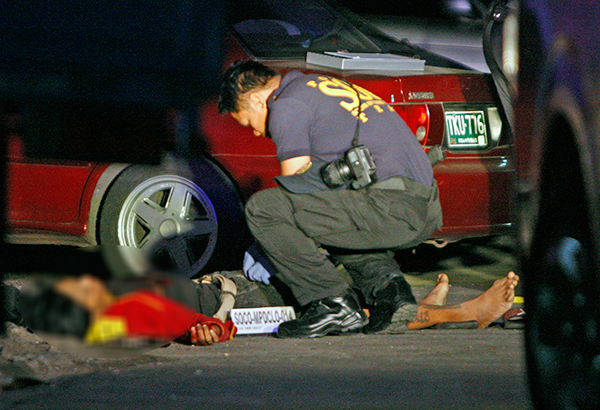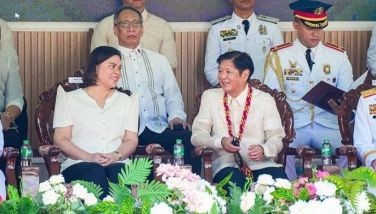More Pinoys doubt ‘nanlaban’

The poll, taken from Sept. 23 to 27, found 37 percent of adult Filipinos who think police officers are not telling the truth, up from 28 percent in June. Joven Cagande, File
MANILA, Philippines — More Filipinos doubt police claims that the suspects they killed in anti-drug operations resisted arrest or “nanlaban,” the latest Social Weather Stations (SWS) survey showed.
The poll, taken from Sept. 23 to 27, found 37 percent of adult Filipinos who think police officers are not telling the truth, up from 28 percent in June.
Those who say they believe police officers are telling the truth, on the other hand, fell from 25 percent in June to 17 percent in September.
The number of Filipinos who could not say whether or not the police are telling the truth remained at 45 percent.
Opinion about the truthfulness of the police was lowest in Metro Manila, with 13 percent saying “definitely/probably telling the truth” and 47 percent saying the police are “probably/definitely not telling the truth.”
In balance Luzon, 13 percent said the police are “definitely/probably telling the truth” and 44 percent claimed they are “probably/definitely not telling the truth.”
In the Visayas, 20 percent believe the police while 34 percent doubt their claim.
More Filipinos in Mindanao (27 percent) said they believe the police are “definitely/probably telling the truth” and 24 percent said “probably/definitely not telling the truth.”
The survey used face-to-face interviews of 1,500 adults nationwide.
Bato: Survey ‘piecemeal attack’ of SWS
Philippine National Police (PNP) chief Director General Ronald “Bato” dela Rosa yesterday slammed the results of the latest SWS survey.
“It’s obvious that’s a piecemeal attack,” Dela Rosa said in a press briefing at Camp Crame.
Dela Rosa also expressed frustration that the results of the survey on police anti-drug operations were still released even after President Duterte removed the PNP from the government anti-drug campaign following allegations of irregularities in police operations.
“We have already left the war on drugs and yet they still keep on releasing questions that have been settled a long time ago,” he said.
Duterte distances self from drug war
After some policemen were accused of executing teenage drug suspects, the President has distanced himself from the government’s anti-drug campaign, which is now being handled by the Philippine Drug Enforcement Agency (PDEA).
Duterte said he no longer wants to receive reports about drug-related operations as he is giving PDEA a free hand to perform its duty.
“Do not give me reports. Let the PDEA do its job. I don’t know if it is really the right path but that’s what I thought of. Leave it that way,” the President said during the wake of former Cebu Archbishop Ricardo Cardinal Vidal last Sunday.
“Drugs, on the other hand, I already gave up everything to avoid issue. I already told the Bureau of Customs, police, armed forces to get out. Including myself,” he added.
Duterte ordered PDEA to handle the crackdown on illegal drugs after two teenage suspects were killed by Caloocan policemen last August.
Policemen claimed that Kian delos Santos, 17, was shot dead after fighting with arresting officers but witnesses said he was killed even if he was already begging for his life.
Carl Arnaiz, 19, was said to have been killed after robbing taxi driver Tomas Bagcal. The taxi driver, however, disowned the statements in the affidavits that were attributed to him and expressed belief that the killing of Arnaiz was “scripted.”
Last week, Duterte said he was unsure if the 2,000-strong PDEA can address the drug problem, which he claimed has contaminated at least two million people.
“Would there be enough resources for this agency to deal with the problem effectively? I don’t know. I don’t know because I myself have distanced,” the President said in a speech in Pasay last Wednesday.
“Some are insisting that there is no drug problem, fine, I agree with you. So the 2,000 members would be enough for the entire Philippines,” he added.
Palace welcomes drug rehab deal
As this developed, Malacañang welcomed the drug partnership agreement signed by the Diocese of Novaliches, the Quezon City government and the PNP.
Under the deal, the city government, the police and the diocese will cooperate with each other to implement a community-based drug rehabilitation program.
“The drug rehabilitation partnership agreement signed by the Diocese of Novaliches, Quezon City government and the PNP for a community-based drug rehabilitation program in the Batasan area is a commendable move to pro-actively help the national government in the anti-illegal drug campaign,” presidential spokesman Ernesto Abella said in a statement.
“It is hoped that this kind of partnership can be replicated by the PNP and other offices involved in the comprehensive anti-illegal drugs campaign with other dioceses, as well as other churches and church groups in the country,” he added. – With Alexis Romero, Emmanuel Tupas
- Latest
- Trending


























